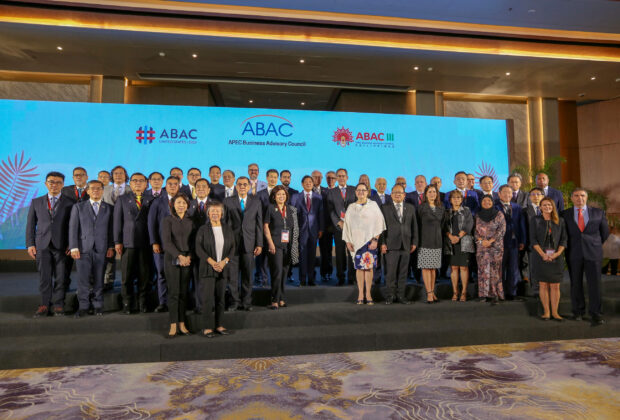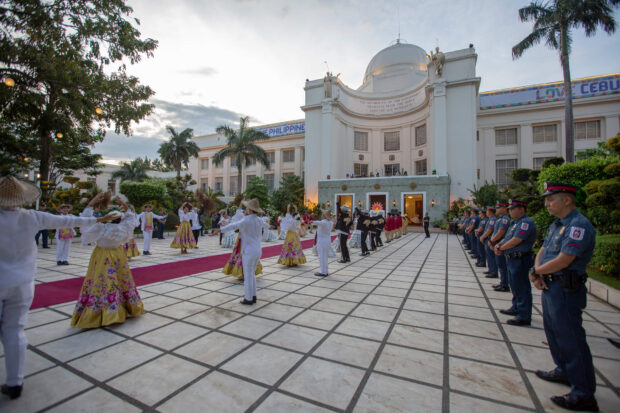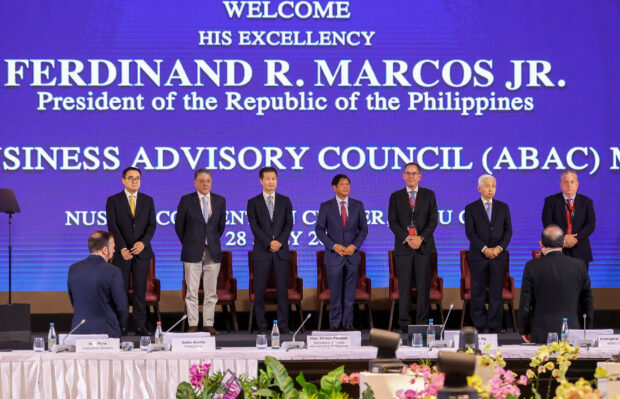The Asia-Pacific Economic Cooperation (APEC) Business Advisory Council (ABAC) held its third meeting for the year, ABAC III, in Cebu, Philippines, from July 27 to 30, 2023. Delegates from the 21 APEC economies, representing business and industry leaders, gathered to discuss pressing issues and opportunities in the region’s economic landscape. This is in preparation for the recommendations that ABAC will formally present to APEC Leaders during their November meeting in San Francisco.

President Ferdinand “Bongbong” Marcos Jr. with ABAC delegates.
Even before the official start of ABAC III, the warmth of Filipino hospitality was evident as international delegates and guests arrived at Mactan-Cebu International Airport, where the nation’s welcoming culture was on full display. Over the course of the next few days, alongside productive sessions and meetings, various showcases and events were organized by host ABAC Philippines that featured the vibrant culture of the country.

A warm welcome for ABAC delegates in front of the Cebu Provincial Capitol.
The local government of Cebu, led by Governor Gwendolyn Garcia, hosted a welcome reception for delegates and guests at the Cebu Provincial Capitol. In her remarks, she recalled Cebu’s history and importance as a trading post. The island has long been host to trade, from global goods and services, and now, with ABAC III, of global ideas and plans.
On July 28, President Ferdinand “Bongbong” Marcos, Jr. addressed ABAC delegates at the Opening Plenary, setting the stage for discussions that would form recommendations to be shared with APEC Leaders such as himself.
“I commend the ABAC Philippines for hosting ABAC here as I urge ABAC members to not only find inspiration from the surroundings to accomplish the deliverables that you have set out in the agenda of your respective working groups, but to also leverage the tools available at your disposal to find a common understanding, be it through the formal and informal sessions, discussions with guests and experts, or interactions with locals, which this excellently organized meeting has quite neatly lined up,” said President Marcos.

In photo (from left): Presidential Advisor on Investment and Economic Affairs Frederick Go, Special Assistant to the President Anton Lagademo, ABAC 2023 Chair Dominic Ng, Philippine President Ferdinand “Bongbong” Marcos Jr., ABAC Philippines member Sabin M. Aboitiz, Secretary of Trade and Industry Alfredo “Fred’ Pascual, and U.S. Senior Official for APEC Matt Murray.
The theme for this year’s ABAC Equity. Sustainability. Opportunity. underscores the essential role of micro-, small-, and medium-sized enterprises (MSMEs) in fostering inclusive growth. It additionally highlights the dynamic landscape of environment, social, and governance (ESG) investing as a critical aspect of achieving sustainable economic development in the region.
The 2023 Work Program for ABAC is divided into five groups: Economic Integration, Sustainable Growth, Digital and Innovation, Finance, and Inclusion. In breakout sessions, business leaders in their respective groups delved into the pressing challenges the region faces, including the path towards the Free Trade Area of the Asia Pacific (FTAAP), addressing climate change issues, promoting a secure transition towards a digital economy, and advancing women inclusion and MSME capacity building.
ABAC 2023 Chair Dominic Ng speaks at the ABAC III Press Conference, discussing the progress of the meeting in preparation for the Dialogue with Leaders.
“In our Report to Leaders, we have identified a range of concrete actions that would advance equity by making it easier for groups with untapped economic potential, including micro-, small, and medium-sized businesses, women, and Indigenous entrepreneurs, to engage in commerce. We have also developed a dynamic toolkit to boost supply chain resilience, drawing on the lessons of the disruptions of the last few years, which will be an important resource for small businesses,” said 2023 ABAC Chair Dominic Ng.
“Besides getting the trade policies right, digital technologies will be key to this. We have developed some important action points on paperless trade and financing, cybersecurity, and other areas,” added Ng.
As the weekend drew to a close, it was a reminder that the ABAC discussions in Cebu are another step in the journey toward fostering sustainable and inclusive growth in the region through collaboration and dialogue.
ABAC delegates engaged in discussion. In photo (front, from left): Sustainable Growth Working Group (SGWG) Chair and ABAC China member Frank Gaoning Ning, SGWG Vice Chair and ABAC Philippines member Sabin M. Aboitiz, Financial Task Force (FTF) Chair and ABAC Japan member Hiroshi Nakaso, and FTF Vice Chair and ABAC Thailand member Kobsak Duangdoo.
The Report to Leaders, drafted by ABAC, will be presented to APEC governments through APEC Senior Officials, Trade, Transportation, SME, Women, Energy, Food Security, Health, and Finance Ministers, and directly to the economic leaders at the annual Dialogue with APEC Leaders.
“Similar to the historic journey of Ferdinand Magellan, who landed on the shores of Cebu over five centuries ago, we embarked on our own voyage of exploration at ABAC – not overseas, but across ideas, challenges, and opportunities,” said Aboitiz Group President and CEO and ABAC PH member Sabin M. Aboitiz.
“In the same spirit of curiosity, resilience, and ambition that characterizes Cebu’s history, we’ve had engaging dialogues, exchanged innovative ideas, and shared intelligent strategies. Our joint efforts on addressing food insecurity, reinforcing global health systems, and promoting sustainable practices have laid the groundwork for a more resilient, inclusive, and sustainable Asia-Pacific region,” Aboitiz added.
ADVT.

